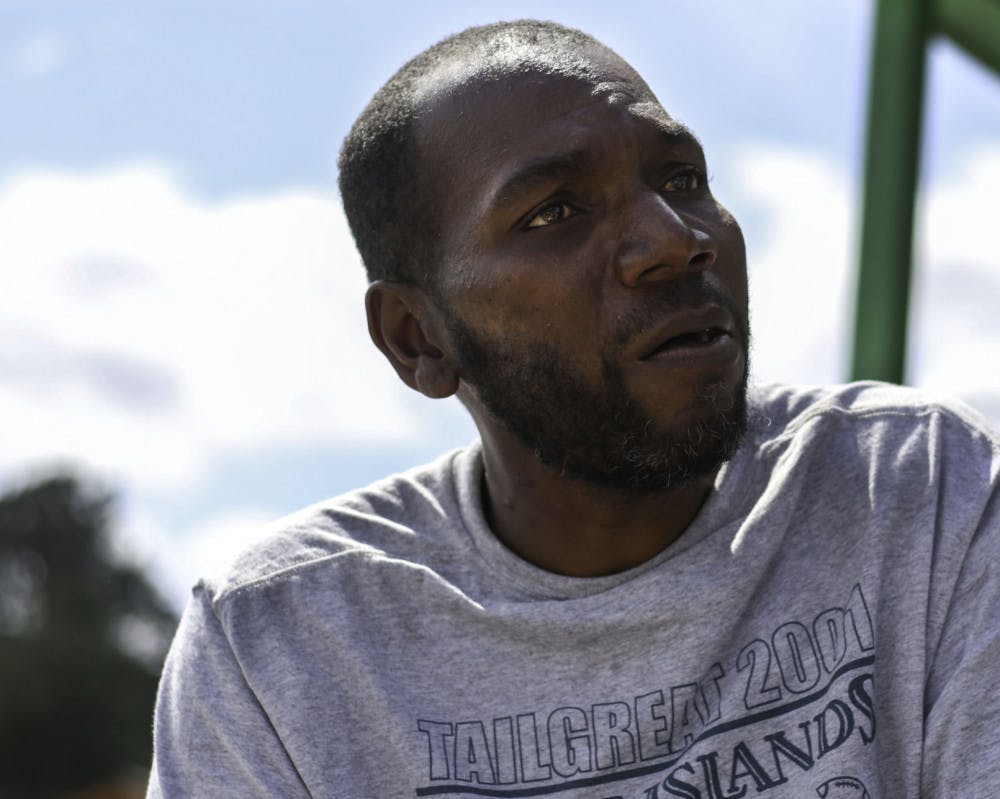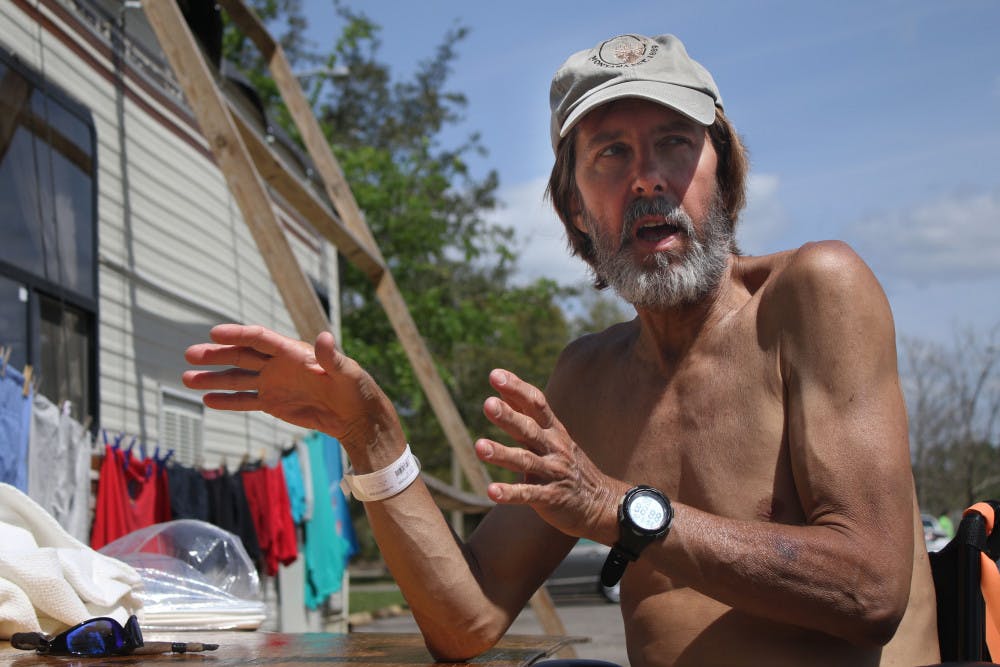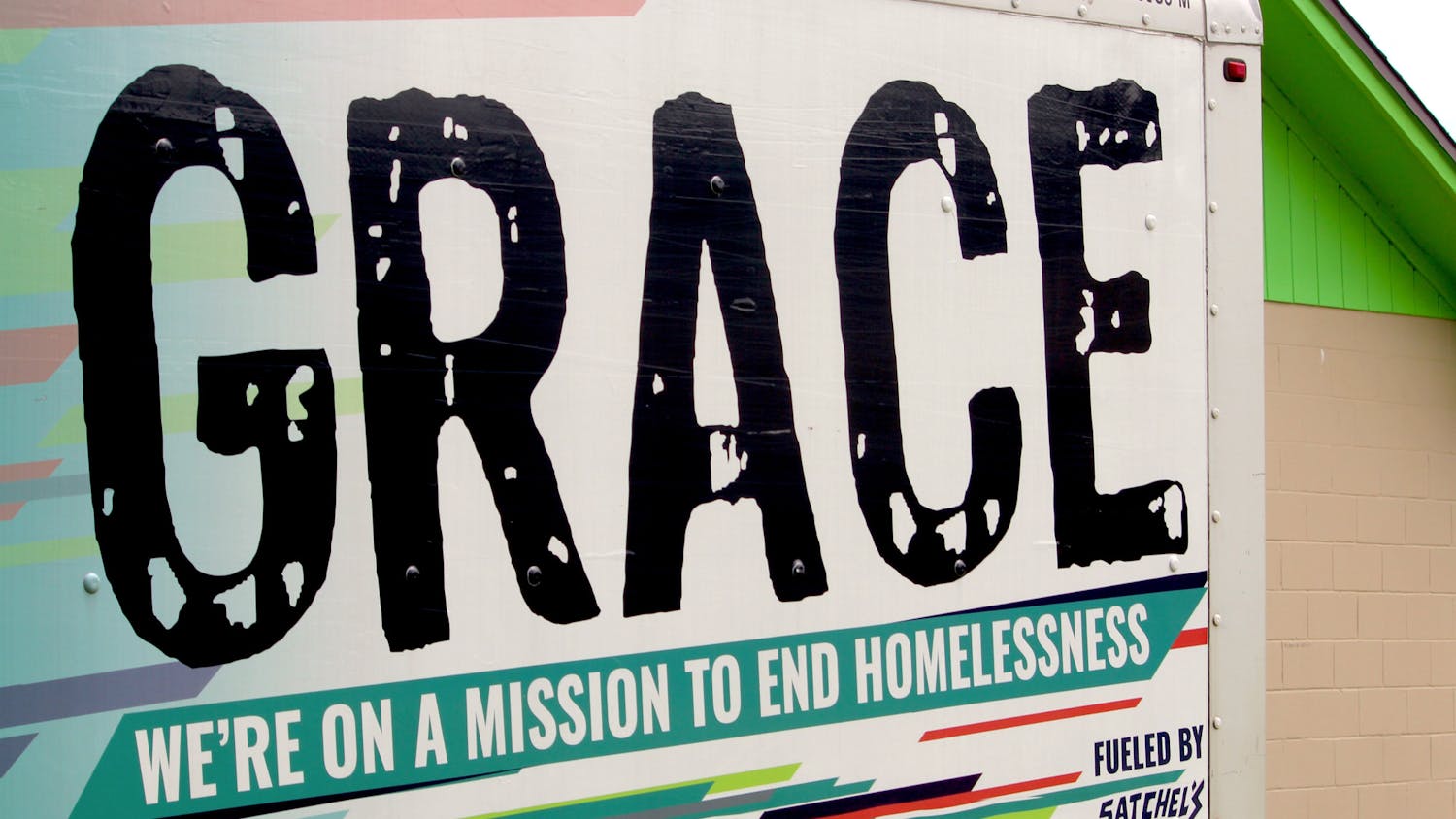Ellen Miller’s hot pink fingernails peeked out of her fists as she folded her hands together and searched for the words to describe her situation.
“I didn’t feel human,” Miller said.
She pursed her lips and took a deep breath.
“It could be you.”
Some students in Gainesville live in luxury apartments near UF where a one-bedroom apartment commonly costs $1,700 a month. Blocks away, people like Miller are searching for help with homelessness.
Across town in St. Francis House homeless shelter, Savannah Dickson watched her 11-month-old daughter crawl from toy to toy on the dirty floor, reflecting on some of her life choices.
“I’m not surprised that I’ve had hardships,” Dickson said. “I never thought I’d be in a homeless shelter with a baby. But hardships? Yeah.”
Dickson, 30, is one of 35 people every night who seeks shelter at one of two homeless shelters in Gainesville.
In 2018, there were 641 documented homeless people in streets and shelters in Alachua County, a number that has been decreasing, according to the North Central Florida Coalition for the Homeless and Hungry.
On the other side of town in a makeshift city of tents, Mark Venzke sat shirtless in his wheelchair hanging pants on a clothesline outside of his 1980s Chevy motorhome.
Around the other side of the van, the 4-by-6-foot blue tent is his home.
“I don’t consider myself homeless. I consider myself under-housed,” Venzke said. “My tent is my home, and it should be treated as such by others.”
Organizations fighting homelessness in North Florida emphasize that people can’t fight addiction or abuse without stable housing, said Mona Gil de Gibaja, the president and CEO of United Way of North Central Florida,
Gil de Gibaja said the fair market rent, a standard measurement used by housing authorities, for a one-bedroom apartment in Alachua County is about $800. A two-bedroom is about $900.
“That’s a lot of money, and that’s not necessarily including utilities,” Gil de Gibaja said.
People without financial means and no housing options left in Gainesville turn to places like St. Francis House.
The green building, opened in 1993, sits between the Milam Funeral Home and the old firehouse building downtown. Inside, homeless families find refuge in the communal living shelter.
St. Francis House offers temporary housing specifically for families, said Kent Vann, St. Francis House Gainesville executive director. Along with temporary shelter, it also offers permanent affordable housing options.
Arbor House, housing exclusively for single women and children, has 30 units, where rent is no more than $400 a month including utilities. Sunrise Apartments, affordable housing for both men and women, has 33 units.
In January, 92 percent of people who stayed at St. Francis House found permanent housing, Vann said.
Ellen Miller is one of those people.
She spent nine months living in St. Francis House, writing letters to God. It helped her cope with being homeless. Now that she works there as a receptionist, she still writes to God during her 12-hour overnight shifts.
Miller worked as a property manager for an apartment complex in Gainesville, but she quit the job, confident she could find other work. After five months of searching, she ran out of money and ended up living in her car with her teenager.
She eventually moved into St. Francis House after living in her car for three months.
“You may have an image of what a homeless person is, but they don’t all fit that image,” Ellen said.
As the director of St. Francis House, Vann said he’s proud of what he does and of stories like Miller’s.
He proudly played an old voicemail from a woman with four children, who moved out of St. Francis House two weeks earlier.
“I’m just calling to say thanks so much for your help and everything you’ve done for my family and I,” her raspy voice played off the phone.
For Vann, helping the children is the most important part of his job.
“When you see one sleeping in their cars or in a tent or in the woods, think of yourself,” Vann said. “It would be a nightmare.”
Grace Marketplace, on the other hand, is not a place for children.
Leading into the compound, a man slept in a ditch with his pants halfway down his legs. A dog barked out the window from a car packed with someone’s entire life.
It’s a low-barrier shelter, meaning there are no requirements or police clearance to enter.
The Alachua County Coalition for the Homeless and Hungry opened GRACE in 2014, which annually receives about $1.4 million split between the city of Gainesville and Alachua County.
Located across the street from Gainesville Regional Airport, GRACE, which was previously a prison, provides people with shelter, showers, meals, health care and other services.
Carlos King, 41, spends his days rolling around GRACE marketplace in his wheelchair, so he can receive services, like the ham sandwich he had for lunch.
Three years ago, King went to bed with a smile on his face knowing he had a well-paying job as a construction worker. The next morning he jolted awake in pain.

Outside the Grace Marketplace cafeteria, Carlos King, 41, shares some of the hardships he faced in life after he was diagnosed with peripheral neuropathy, which damaged his nerves and left him homeless and in a wheelchair.
He said he was diagnosed with peripheral neuropathy, a nerve damage condition that left him jobless, homeless and in constant pain.
“Sometimes, it feels like I’ve been thrown down into the pits of hell and walking through fire, burning alive in pain,” King said. “But that’s life though, you never know.”
His eyes welled with tears and his voice grew louder as he recounted one of his greatest moments at Grace: his first steps after doctors told him he wouldn’t walk again.
“I can’t say nothing bad about this place because I took my first steps here,” King said. “I got up on that walker and took 54 steps. Since then, I got up to 180. How ‘bout that? ”
There is a discussion among the City Commission to close Dignity Village, a colony of hundreds of tents outside of Grace's gates, City Commissioner Helen Warren said.
“That as a structure has not been working very well,” Warren said. “Without having 24 hours, seven days a week supervision, there are just too many fights that go on out there.”
Last week, a worker was stabbed and someone got hit with a log, Warren said.
Mark Venzke, 62, lives in Dignity Village out of his Chevy motorhome.
Some nights, Venzke can smell aromas from burning drugs sneaking in through the thin walls of his plastic tent. But he said he tries to make his neighborhood better.
He regularly writes emails to the commission with suggestions on how to improve the facilities at GRACE Marketplace and Dignity Village. He ran for Gainesville mayor in 2013 and city commissioner in 2014. He lost each election.
In 2015, he was diagnosed with bone marrow cancer.
But Venzke still has a lot of plans. He’s currently renovating his motorhome after a rat infestation, but once it’s complete, he plans to leave Dignity Village.
“Hopefully, I won’t be here tomorrow, but I always think that. Then another month goes by, another month goes by, and I’m still here,” Venzke said. “I don’t want to be here.”
Total number of documented homeless people on the street and in shelters in Alachua County: 641
People on the street: 450
People in shelters: 191
People in jail: 84
People in the hospital: 27
Fair market rent for one-bedroom apartment in Alachua County: $800






